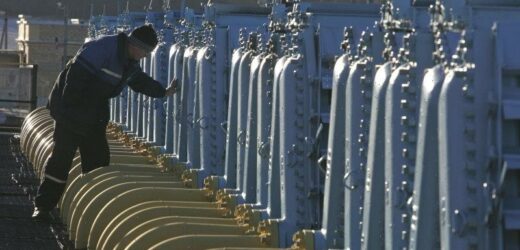For 50 odd years Victoria enjoyed almost limitless, inexpensive energy to power industry and fuel our homes, thanks to the enormous reserves of natural gas right on our doorstep in Bass Strait.
It was good while it lasted.
Russia remains the EU bloc’s leading supplier of oil, natural gas and solid fossil fuels such as coal.Credit:AP
Due to a confluence of both domestic and geopolitical factors that Treasurer Jim Chalmers this week dubbed a “perfect storm” – including sanctions on Russian fuel exports, unreliable coal-fired power stations, lower than usual generation from renewables, and the sudden east coast cold snap – the cost of energy in general, and gas in particular, is suddenly soaring.
There are even fears of a gas shortage, with talk in Canberra of holding back from export a reserve for the eastern seaboard or triggering the esoteric Australian Domestic Gas Security Mechanism, a measure meant to ensure local gas prices don’t outpace global ones.
Neither outcome is likely to eventuate, given they would undermine Australia’s reputation as a reliable exporter, and authorities have assured us there are adequate supplies for now, but the whiff of panic is real. Did we ever expect to see a Labor government calling on coal-fired power stations to increase production?
The energy shock will take some time to work its way through to households, which are largely protected from short-term price fluctuations by contracts and regulators such as Victoria’s Essential Service Commission and the Australian Energy Market Operator, which this week intervened to cap spiking spot gas prices.
But be in no doubt: the days of limitless “stored sunshine” are over.
This hasn’t come out of the blue. The Age noted in an editorial a year ago that we need to reduce our reliance on natural gas, with prices already rising noticeably then, and given its contribution to the state’s total carbon emissions.
Nor is this news to the many climate-minded Victorians whose homes are already gas-free, powered by rooftop solar and batteries. A coalition of local councils, meantime, is petitioning the state government to remove a regulation that makes a gas connection mandatory for new homes, which would take it out of the equation forever for a new generation of homeowners. The UK has gone so far as to ban the installation of gas-fired boilers in newly built homes from 2025.
There are parallels with electric cars. Not that long ago they were derided by none other than our then-prime minister. As the range of models grows, prices drop, petrol prices continue to rise and the charging network grows, it’s becoming more practical and socially acceptable to own one.
Resources Minister Madeleine King wants more coal-fired power made available.Credit:Alex Ellinghausen
A nationwide switch from gas (and coal) to renewable-powered electricity will be an enormous undertaking, encompassing everything from upgrading the national transmission grid to making better use of peak solar production – much of which is currently wasted – to millions of individual households switching their gas hot water over to heat pumps and their (beloved) gas stoves to (strange new) induction cooktops. This is clearly not something that will happen overnight.
Meantime, as Innes Willox, chief executive of the national employer association Ai Group, this week suggested, we could compensate the most vulnerable households and businesses with a plan akin to JobKeeper, “targeted, time-limited and proportionate”. The UK is already giving every household a £400 ($700) discount off its energy bill to help with rising prices, with another £650 payment for the poorest households.
We should also revisit the business model that sees more than 70 per cent of our gas exported: can it be tweaked to give us better security of supply domestically? But that is not a long-term solution. Nor, clearly, is coal, which we acknowledge the government suggests should be a stop-gap measure.
“It’s a whole power generation mix to get to a net-zero position,” Resources Minister Madeleine King said on Friday. “It demonstrates we do need a solid energy plan that is bipartisan, so there is greater investment in new technologies in both storage, renewables and gas supply to firm up the whole system.”
If we ever needed a wake-up call to end the years of bickering about the renewables road map and the urgent need for a bilateral, nationwide plan to exit coal and reduce our reliance on gas, this week’s energy crisis is surely it.
Gay Alcorn sends an exclusive newsletter to subscribers each week. Sign up to receive her Note from the Editor.
Most Viewed in National
From our partners
Source: Read Full Article



